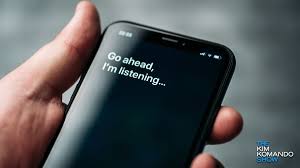Yes, your phone is watching you

Be aware of the privacy settings and accessibility of your information when using your smartphone–the image above depicts the mentality associated with the smartphone’s capabilities beyond the screen.
January 5, 2021
Countless numbers of studies have proven that the everyday object you hold in your hands is watching you. Is it possible that your smartphone is listening and watching your every movement?
According to statista.com, one of the most popular products that nearly 3.5 billion people use on a daily basis, in which half are smartphone users, could potentially be a major threat to your safety. Think about it–many apps on a typical smartphone require a microphone or camera. What if they never turn off? What if there is someone behind your screen? We don’t exactly know if this information is correct, however, there is plenty of research that suggests it. According to komando.com, there has been new research studied from professors at Northeastern University in Boston that proposes the idea that your phone is not only listening to you without permission, but that it is secretly watching you. “Their study analyzed 17,260 popular Android apps, including a number of Facebook-owned apps, and of these apps, 9,000 had permissions to access a smartphone’s camera and microphone.” The majority of teens in the U.S., let alone the whole world, are active on some sort of social media platform, whether it’s Facebook, Instagram, Snapchat, Twitter, Youtube, TikTok, or a combination of each. All of these platforms use some sort of social interaction between you and others using a microphone or camera. Researchers at Northeastern University have found that these apps can actually record videos of your activity and send it to other third parties. Some apps in particular do this to capture your personal information, like where you live.
The deeper question is, who is getting all of this information and why would it be beneficial to them? While many of us are already freaked out by the idea that our phone is watching us, have we really thought about who is collecting this information and what they’re doing with it?
Countless numbers of sources have revealed research that has shown that all of our information, personal messages, and photos can go to either one of two people, the first being the government. Information from theguardian.com suggests, “government security agencies like the NSA can also have access to your devices through in-built-in backdoors.” In-built backdoors is a shorter term that means that these secret agencies can secretly listen to your phone calls, messages, pictures, videos and files at any time. Hackers can also use their resources to hack into apps, PDF files, social media, and even emojis. “Once a user opens this PDF file, the hacker can then: install whatever software/app they like on the user’s device, use a keylogger to grab all their passwords, steal all documents from the device, take pictures and stream videos from their camera, capture past or live audio from the microphone, and then upload incriminating images/documents to their PC, and notify the police.”
Now, have you ever talked about something and then get an ad for it the next day? Similar to products like the Amazon Echo and Google Home, your smartphone is listening for “wake up” words like “Hey Siri” and “Okay Google” constantly. It is very possible that your phone is listening to a lot more than just that.
On Vice.com, studies show that your phone is indeed listening to you, but not necessarily how many think it is. According to Dr. Peter Henway, “the short answer is yes, but perhaps not in a way that’s not as diabolical as it sounds.” Similar to what I said above Third party apps like Instagram and Facebook do have access to your personal information and “non-triggered” data, however, it’s up to them if they use and release it. The article from Vice.com also explains how these apps could also possibly have trigger words. “…whether it’s timing or location-based or usage of certain functions.” Researchers claim that these could certainly be the answer to why we get ads on things we have talked about.
Despite all of the conspiracies behind the smartphone, there are some ways you can stop it.
If you don’t like the idea that your phone is listening and recording you, then sending it to the government, you can simply just go to your settings and disable “Her Siri,” “Hey Google,” and your microphone for plenty of apps. Because of these options, privacy policies, and end-user agreements you signed before purchasing your phone, it makes listening and watching without your knowledge legal.
Approximately 3.5 billion people purchase and use smartphones every year. This highly successful device has made numerous things possible for us to do. In spite of all the theories surrounding the smartphone, the product has made its way up to the top as one of the most popular items ever created. When using your smartphone, always be mindful of what’s happening beyond the screen.